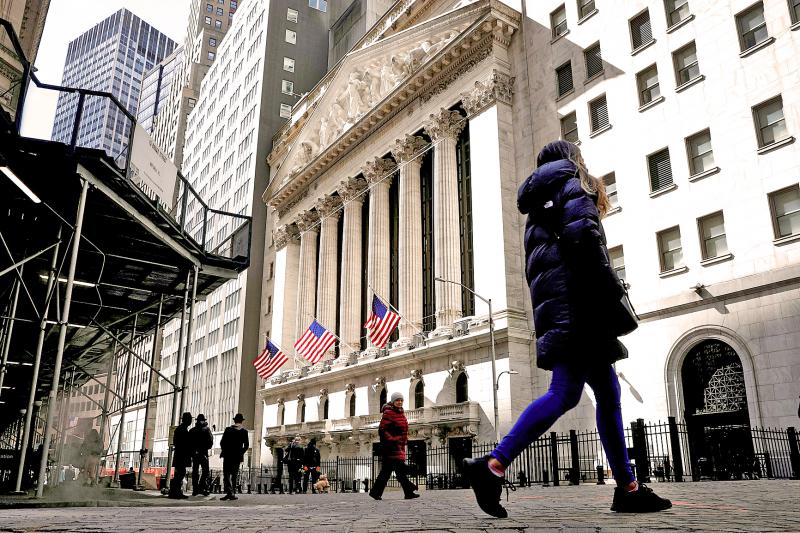Apple Inc’s iPhone 13 debut was met with a stock slump on Tuesday, keeping with a tradition of poor share price performance on the day new devices are unveiled.
Shares of the technology giant sank after Apple executives, including chief executive officer Tim Cook, presented the new lineup of phones and other devices.
The stock fell 1 percent to close at US$148.12 in New York trading. Prior to Tuesday, Apple’s shares fell on three-quarters of the days Apple unveiled new iPhones, data compiled by Bloomberg showed.

Photo: Reuters
Excluding Apple’s 8.3 percent rally on the day cofounder Steve Jobs announced the first iPhone in 2007, Apple shares have fallen an average of 0.8 percent the day of a debut.
Sales of iPhones accounted for nearly half of Apple’s revenue last quarter.
The poor performance is probably the result of investors becoming accustomed to regular innovation from Apple and many of the details being reported prior to the presentations, Bespoke Investment Group said in a note to clients on Monday.
“Any positive impact of a new release has typically already been priced into the stock,” the research company said.
Apple shares have posted double-digit gains this year, on pace for their third annual climb, boosted by investor optimism on the company’s growth outlook, but the stock took a hit last week after a US federal judge ordered the firm to alter its App Store business model.
The shares posted their biggest drop in four months after the ruling, with the sell-off at one point wiping out US$85 billion in market value from the company.
Still, Wall Street is sanguine on the stock.
About 80 percent of 47 analysts covering Apple have a buy rating on the shares, with only two recommending to sell it, Bloomberg data showed.
On average, they expect Apple to climb another 11 percent over the next 12 months as of Monday’s closing price.
On Tuesday, the Cupertino, California-based company introduced four iPhone 13 models with some minor enhancements, including a faster processor, better camera, longer battery life and nicer displays.
They are similar in design to last year’s iPhones, other than a smaller notch for the front-facing camera on top of the screen, and they start at the same price points.
Two new iPhone Pro models would have a higher-quality video-recording feature and a smoother-scrolling display that updates more frequently, along with the ability to expand storage to 1 terabyte — double the capacity of the biggest option last year.
After last year’s big 5G upgrade, the incremental nature of this year’s improvements might be a letdown to some and offer little incentive to upgrade.
Moreover, the overall picture for iPhone 13 demand might be mixed for the coming year.
Surveys show consumers are less inclined to spend big money for minor feature additions and are holding their current phones longer.
Last week, Piper Sandler published data that showed a considerable lack of interest in Apple’s next-generation smartphones.
The firm’s survey of 1,000 Americans showed that only 6 percent of the respondents said they planned to buy the iPhone 13 this fall or winter, down significantly from 10 percent last year.

Taiwan Semiconductor Manufacturing Co (TSMC, 台積電), the world’s biggest contract chipmaker, booked its first-ever profit from its Arizona subsidiary in the first half of this year, four years after operations began, a company financial statement showed. Wholly owned by TSMC, the Arizona unit contributed NT$4.52 billion (US$150.1 million) in net profit, compared with a loss of NT$4.34 billion a year earlier, the statement showed. The company attributed the turnaround to strong market demand and high factory utilization. The Arizona unit counts Apple Inc, Nvidia Corp and Advanced Micro Devices Inc among its major customers. The firm’s first fab in Arizona began high-volume production

VOTE OF CONFIDENCE: The Japanese company is adding Intel to an investment portfolio that includes artificial intelligence linchpins Nvidia Corp and TSMC Softbank Group Corp agreed to buy US$2 billion of Intel Corp stock, a surprise deal to shore up a struggling US name while boosting its own chip ambitions. The Japanese company, which is adding Intel to an investment portfolio that includes artificial intelligence (AI) linchpins Nvidia Corp and Taiwan Semiconductor Manufacturing Co (TSMC, 台積電), is to pay US$23 a share — a small discount to Intel’s last close. Shares of the US chipmaker, which would issue new stock to Softbank, surged more than 5 percent in after-hours trading. Softbank’s stock fell as much as 5.4 percent on Tuesday in Tokyo, its

COLLABORATION: Softbank would supply manufacturing gear to the factory, and a joint venture would make AI data center equipment, Young Liu said Hon Hai Precision Industry Co (鴻海精密) would operate a US factory owned by Softbank Group Corp, setting up what is in the running to be the first manufacturing site in the Japanese company’s US$500 billion Stargate venture with OpenAI and Oracle Corp. Softbank is acquiring Hon Hai’s electric-vehicle plant in Ohio, but the Taiwanese company would continue to run the complex after turning it into an artificial intelligence (AI) server production plant, Hon Hai chairman Young Liu (劉揚偉) said yesterday. Softbank would supply manufacturing gear to the factory, and a joint venture between the two companies would make AI data

The Taiwan Automation Intelligence and Robot Show, which is to be held from Wednesday to Saturday at the Taipei Nangang Exhibition Center, would showcase the latest in artificial intelligence (AI)-driven robotics and automation technologies, the organizer said yesterday. The event would highlight applications in smart manufacturing, as well as information and communications technology, the Taiwan Automation Intelligence and Robotics Association said. More than 1,000 companies are to display innovations in semiconductors, electromechanics, industrial automation and intelligent manufacturing, it said in a news release. Visitors can explore automated guided vehicles, 3D machine vision systems and AI-powered applications at the show, along